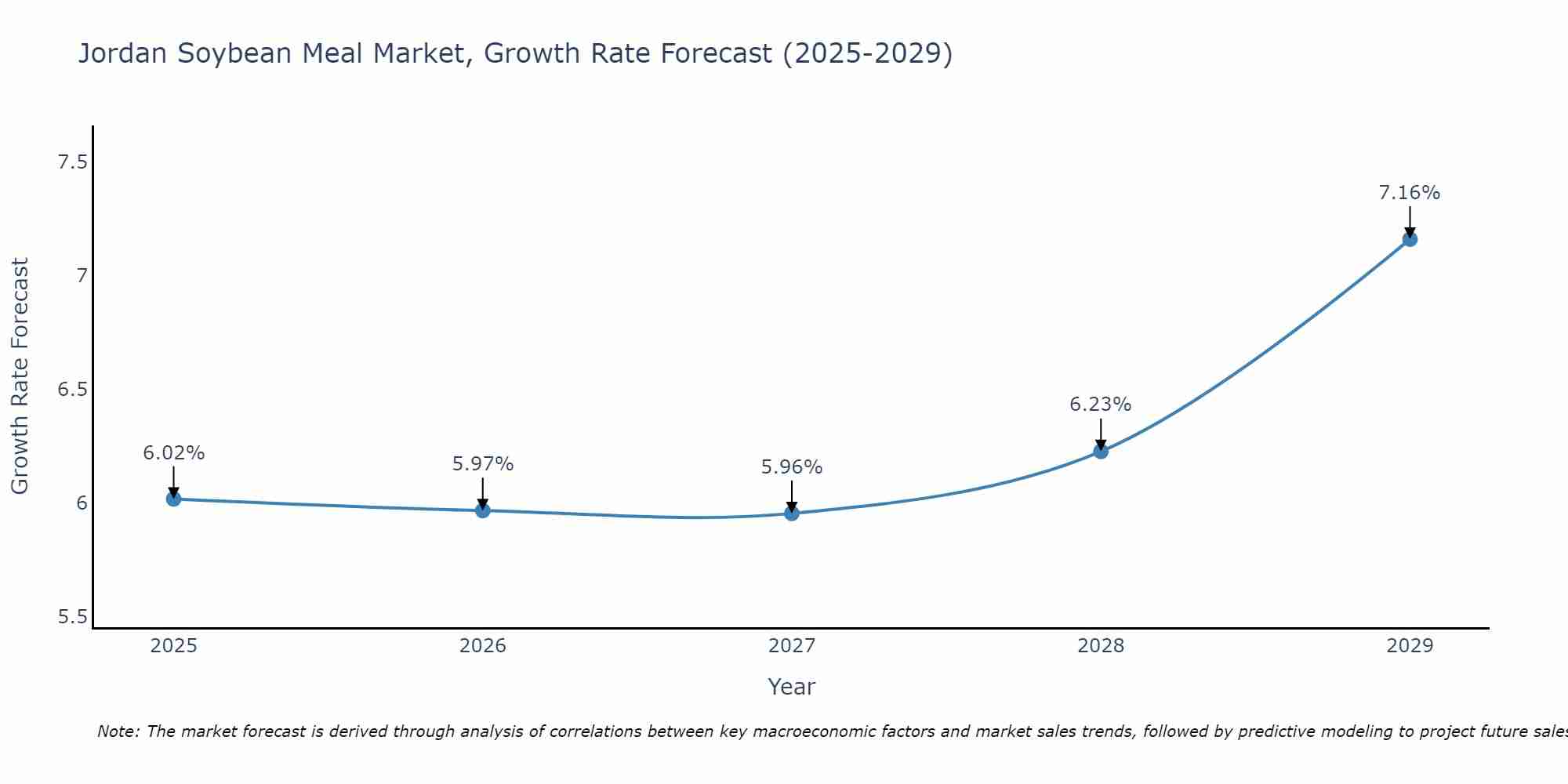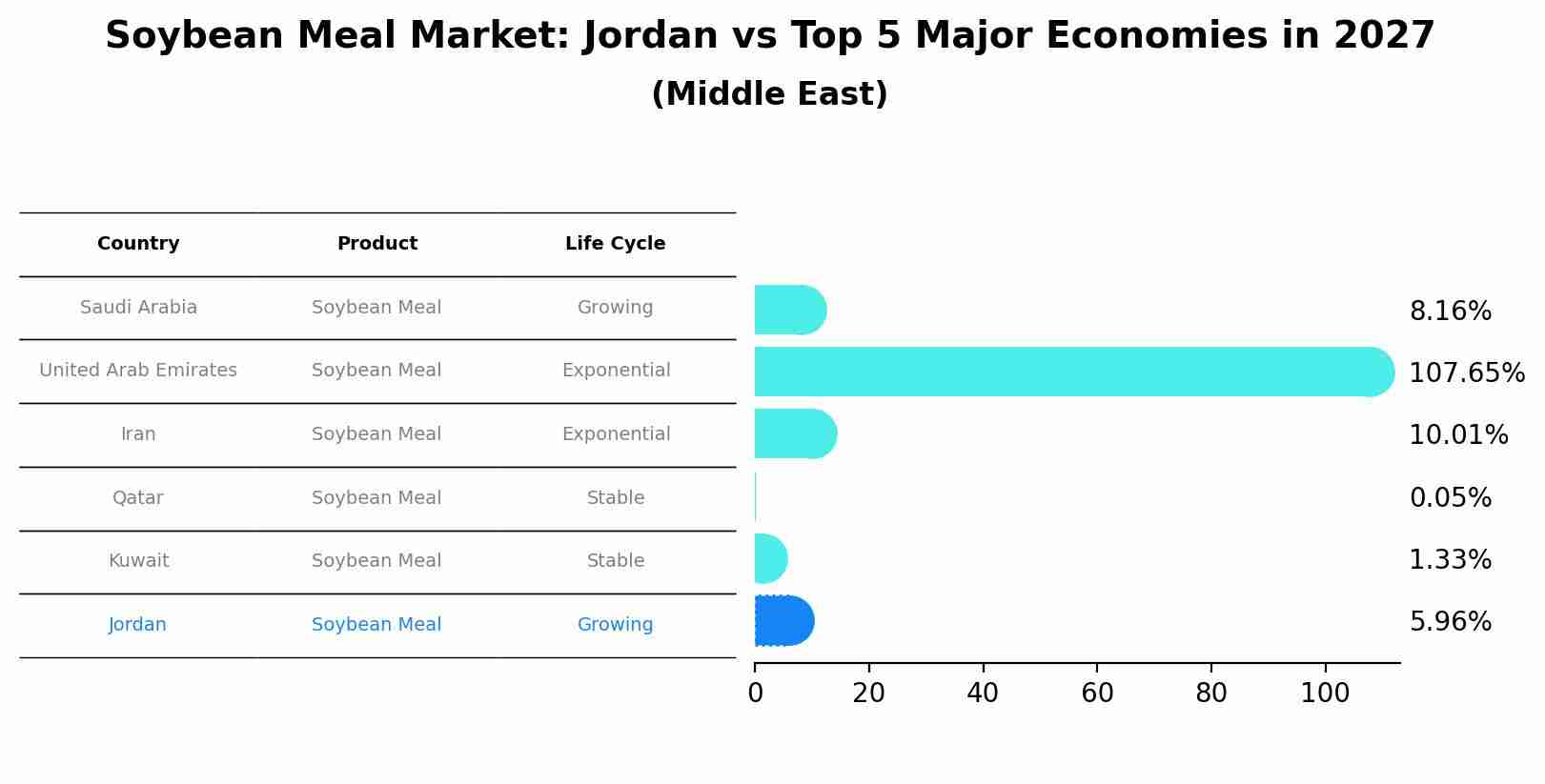Jordan Soybean Meal Market Outlook | Growth, Industry, Analysis, Value, Size, Trends, Forecast, Revenue, COVID-19 IMPACT, Companies & Share
| Product Code: ETC385006 | Publication Date: Aug 2022 | Updated Date: Jul 2025 | Product Type: Market Research Report | |
| Publisher: 6Wresearch | Author: Sumit Sagar | No. of Pages: 75 | No. of Figures: 35 | No. of Tables: 20 |
Jordan Soybean Meal Market Size Growth Rate
The Jordan Soybean Meal Market is projected to witness mixed growth rate patterns during 2025 to 2029. Commencing at 6.02% in 2025, growth builds up to 7.16% by 2029.

Soybean Meal Market: Jordan vs Top 5 Major Economies in 2027 (Middle East)
By 2027, Jordan's Soybean Meal market is forecasted to achieve a growing growth rate of 5.96%, with Saudi Arabia leading the Middle East region, followed by United Arab Emirates, Iran, Qatar and Kuwait.

Jordan Soybean Meal Market Synopsis
The Jordan soybean meal market is witnessing steady growth due to the increasing demand for animal feed in the country`s growing livestock industry. Soybean meal is a key protein source used in animal feed formulations, especially for poultry and livestock production. The market is driven by factors such as the rising consumption of meat products, growth in animal husbandry practices, and the focus on improving feed efficiency. Jordan`s reliance on imports to meet its soybean meal demand presents opportunities for international suppliers looking to enter the market. Additionally, the government`s initiatives to support the agriculture sector and promote self-sufficiency in animal feed production are expected to further boost the demand for soybean meal in Jordan.
Jordan Soybean Meal Market Trends
As of recent trends in the Jordan Soybean Meal Market, there has been a notable increase in demand driven by the growing awareness of the nutritional benefits of soybean meal in animal feed. The market has also witnessed a rise in soybean meal imports to meet the escalating demand from the livestock and poultry industries. Additionally, the emphasis on sustainable and eco-friendly agricultural practices has led to a shift towards the use of soybean meal as a preferred protein source over traditional alternatives. Market players are focusing on product innovation and quality to cater to the evolving consumer preferences, while also exploring opportunities for domestic soybean cultivation to reduce reliance on imports. Overall, the Jordan Soybean Meal Market is experiencing steady growth and is poised for further expansion in the coming years.
Jordan Soybean Meal Market Challenges
In the Jordan Soybean Meal Market, several challenges are faced, including limited domestic production, reliance on imports, fluctuating international prices, and competition from alternative protein sources. The country`s arid climate and limited agricultural land pose obstacles to increasing local soybean cultivation, leading to a heavy dependence on imports to meet the demand for soybean meal in the livestock feed industry. Fluctuations in international prices can impact the cost-effectiveness of imports, affecting profit margins for businesses in the market. Additionally, competition from other protein sources such as fish meal or alternative plant-based proteins further complicates market dynamics. Addressing these challenges requires strategic planning, investment in agricultural infrastructure, and diversification of protein sources to ensure a sustainable and resilient soybean meal market in Jordan.
Jordan Soybean Meal Market Investment Opportunities
In the Jordan Soybean Meal Market, there are promising investment opportunities due to the increasing demand for soybean meal as a key ingredient in animal feed production. The country`s growing livestock and poultry industry, coupled with the rising awareness of the benefits of soybean meal in animal nutrition, present a favorable environment for investment. Investors can consider opportunities in soybean meal processing plants, distribution networks, and partnerships with local feed manufacturers to meet the rising demand. Additionally, leveraging technology and sustainable practices in soybean cultivation and processing can further enhance the market position and profitability of investments in the Jordan Soybean Meal Market. Overall, the market offers potential for growth and diversification for investors looking to capitalize on the evolving agricultural landscape in Jordan.
Jordan Agar Market Government Policies
The government of Jordan has implemented several policies related to the soybean meal market to support domestic production and reduce reliance on imports. These policies include providing subsidies and incentives to local soybean farmers to increase production, offering financial support for the establishment of soybean processing facilities within the country, and imposing tariffs on imported soybean meal to protect domestic producers. Additionally, the government has focused on promoting research and development in the agriculture sector to improve soybean crop yields and quality. These policies aim to enhance food security, reduce import dependency, and boost the competitiveness of Jordan`s soybean meal market.
Jordan Soybean Meal Market Future Outlook
The Jordan Soybean Meal Market is poised for steady growth in the coming years, driven by increasing demand for soybean meal as a key protein source in animal feed production. Factors such as a growing livestock industry, rising consumer awareness about the benefits of soy products, and expanding investments in agricultural infrastructure are expected to contribute to market expansion. Additionally, the government`s support for agricultural development and initiatives to enhance self-sufficiency in feed production are likely to bolster the soybean meal market in Jordan. However, challenges such as fluctuating raw material prices and competition from alternative protein sources could impact market dynamics. Overall, the future outlook for the Jordan Soybean Meal Market appears positive, with opportunities for growth and innovation in the sector.
Key Highlights of the Report:
- Jordan Soybean Meal Market Outlook
- Market Size of Jordan Soybean Meal Market, 2021
- Forecast of Jordan Soybean Meal Market, 2031
- Historical Data and Forecast of Jordan Soybean Meal Revenues & Volume for the Period 2018 - 2031
- Jordan Soybean Meal Market Trend Evolution
- Jordan Soybean Meal Market Drivers and Challenges
- Jordan Soybean Meal Price Trends
- Jordan Soybean Meal Porter's Five Forces
- Jordan Soybean Meal Industry Life Cycle
- Historical Data and Forecast of Jordan Soybean Meal Market Revenues & Volume By Application for the Period 2018 - 2031
- Historical Data and Forecast of Jordan Soybean Meal Market Revenues & Volume By Animal Feed for the Period 2018 - 2031
- Historical Data and Forecast of Jordan Soybean Meal Market Revenues & Volume By Food Industry for the Period 2018 - 2031
- Historical Data and Forecast of Jordan Soybean Meal Market Revenues & Volume By Beverage for the Period 2018 - 2031
- Historical Data and Forecast of Jordan Soybean Meal Market Revenues & Volume By Healthcare Products for the Period 2018 - 2031
- Jordan Soybean Meal Import Export Trade Statistics
- Market Opportunity Assessment By Application
- Jordan Soybean Meal Top Companies Market Share
- Jordan Soybean Meal Competitive Benchmarking By Technical and Operational Parameters
- Jordan Soybean Meal Company Profiles
- Jordan Soybean Meal Key Strategic Recommendations
Frequently Asked Questions About the Market Study (FAQs):
- Single User License$ 1,995
- Department License$ 2,400
- Site License$ 3,120
- Global License$ 3,795
Search
Thought Leadership and Analyst Meet
Our Clients
Related Reports
- Canada Oil and Gas Market (2026-2032) | Share, Segmentation, Value, Industry, Trends, Forecast, Analysis, Size & Revenue, Growth, Competitive Landscape, Outlook, Companies
- Germany Breakfast Food Market (2026-2032) | Industry, Share, Growth, Size, Companies, Value, Analysis, Revenue, Trends, Forecast & Outlook
- Australia Briquette Market (2025-2031) | Growth, Size, Revenue, Forecast, Analysis, Trends, Value, Share, Industry & Companies
- Vietnam System Integrator Market (2025-2031) | Size, Companies, Analysis, Industry, Value, Forecast, Growth, Trends, Revenue & Share
- ASEAN and Thailand Brain Health Supplements Market (2025-2031) | Strategy, Consumer Insights, Analysis, Investment Trends, Opportunities, Growth, Size, Share, Industry, Revenue, Segments, Value, Segmentation, Supply, Forecast, Restraints, Outlook, Competition, Drivers, Trends, Demand, Pricing Analysis, Competitive, Strategic Insights, Companies, Challenges
- ASEAN Bearings Market (2025-2031) | Strategy, Consumer Insights, Analysis, Investment Trends, Opportunities, Growth, Size, Share, Industry, Revenue, Segments, Value, Segmentation, Supply, Forecast, Restraints, Outlook, Competition, Drivers, Trends, Demand, Pricing Analysis, Competitive, Strategic Insights, Companies, Challenges
- Europe Flooring Market (2025-2031) | Outlook, Share, Industry, Trends, Forecast, Companies, Revenue, Size, Analysis, Growth & Value
- Saudi Arabia Manlift Market (2025-2031) | Outlook, Size, Growth, Trends, Companies, Industry, Revenue, Value, Share, Forecast & Analysis
- Uganda Excavator, Crane, and Wheel Loaders Market (2025-2031) | Strategy, Consumer Insights, Analysis, Investment Trends, Opportunities, Growth, Size, Share, Industry, Revenue, Segments, Value, Segmentation, Supply, Forecast, Restraints, Outlook, Competition, Drivers, Trends, Demand, Pricing Analysis, Competitive, Strategic Insights, Companies, Challenges
- Rwanda Excavator, Crane, and Wheel Loaders Market (2025-2031) | Strategy, Consumer Insights, Analysis, Investment Trends, Opportunities, Growth, Size, Share, Industry, Revenue, Segments, Value, Segmentation, Supply, Forecast, Restraints, Outlook, Competition, Drivers, Trends, Demand, Pricing Analysis, Competitive, Strategic Insights, Companies, Challenges
Industry Events and Analyst Meet
Whitepaper
- Middle East & Africa Commercial Security Market Click here to view more.
- Middle East & Africa Fire Safety Systems & Equipment Market Click here to view more.
- GCC Drone Market Click here to view more.
- Middle East Lighting Fixture Market Click here to view more.
- GCC Physical & Perimeter Security Market Click here to view more.
6WResearch In News
- Doha a strategic location for EV manufacturing hub: IPA Qatar
- Demand for luxury TVs surging in the GCC, says Samsung
- Empowering Growth: The Thriving Journey of Bangladesh’s Cable Industry
- Demand for luxury TVs surging in the GCC, says Samsung
- Video call with a traditional healer? Once unthinkable, it’s now common in South Africa
- Intelligent Buildings To Smooth GCC’s Path To Net Zero


















